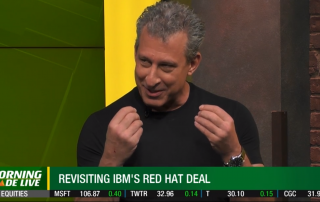Alphacution Debuts on TD Ameritrade Network
Many thanks to Oliver Renick (@OJRenick) and the team @TDANetwork for this one. We had some fun discussing the IBM-RedHat deal, and the implications for the larger cloud infrastructure and AI segments of the enterprise IT arena. Also touched on some thoughts for NVIDIA, AWS, Google and HPE. Based on our recent post, IBM Hides Watson Under a Red Hat. Link to Video here. It's a good one. Enjoy... As always, if you value this work: Like it, share it, comment on it – or discuss amongst your colleagues – and then send us feedback@alphacution.com. As our “feedback loop” becomes more vibrant – given input from clients and other members of our network, especially around new questions to be answered – the value of this work will accelerate. Don’t be shy…





